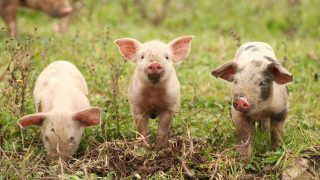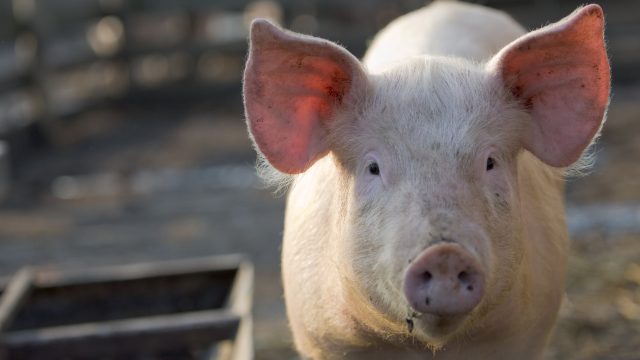
Chicago-Kent College of Law – Foie Gras Panel
Chicago-Kent College of Law "Foie Gras Panel" Draws Experts, Large Crowd to Debate How Far the Government Can Go in Legislating What We Eat
On February 10, 2009, the Chicago-Kent Animal Legal Defense Fund Student Chapter hosted the Chicago-Kent “Foie Gras Panel” to debate the legality, wisdom, and ramifications of Chicago’s former ban on the sale of foie gras.
Panelists included Chicago Alderman Joe Moore, sponsor of the city’s foie gras ban; Chicago-Kent professor Sheldon H. Nahmod, Distinguished Professor of Law and Co-Director of the Institute for Law and the Humanities; and Mark Caro, Chicago Tribune reporter and author of The Foie Gras Wars: How a 5,000-Year-Old Delicacy Inspired the World’s Fiercest Food Fight.
With over sixty attendees, spirited debate among the panelists, and coverage from the Chicago media, the event was a resounding success. The panel focused its discussion on the recent foie gras controversy that has been in the forefront of a heated national debate involving everyone from animal rights activists to politicians, the media, and the nation’s legal scholars.
Foie gras is French for “fat liver” and is an expensive delicacy made from the fattened liver of a duck or goose. The delicacy has existed for centuries; the process for creating it dates back as far as ancient Egypt. But as long as foie gras has existed, it has remained a polarizing and controversial food product.
Foie gras is controversial is because it is typically made through the process of force-feeding. Under this process, a metal pipe is inserted into the throat of a duck or goose and food is pumped into the bird’s stomach. The amount of food force-fed into a bird per day is the equivalent of force-feeding approximately sixteen pounds of pasta to a person. The intentional over-feeding causes a bird’s liver to expand up to ten times its normal size. The bird is then killed and its expanded liver becomes the delicacy known as foie gras.
On April 26, 2006 the Chicago City Council banned the sale of foie gras in Chicago’s restaurants, making Chicago the first city in the history of the world to ban the product. A lawsuit in federal court soon followed, and a federal judge in Illinois Restaurant Association v. City of Chicago upheld the law as constitutional under the Illinois and Federal constitutions. Despite this decision, the ban continued to spark heated debate.
Animal rights activists argued the ban was appropriate because force-feeding causes an extraordinary amount of pain to animals and is therefore cruel. Chefs and restaurant patrons argued they had a right to serve and eat what they want without government intervention. Even Chicago’s Mayor, Richard Daley, joined the dispute, calling the ban the “silliest” law Chicago had ever passed.
Responding to many of these concerns, the Chicago City Council repealed the ban on May 14, 2008. Still, the ban has remained a subject of public fascination and debate because the true nerve of this controversy settles not necessarily on the birds that are force-fed, but on the question of whether it is legal and appropriate for the government to control what the public eats.
Alderman Moore argued that despite the criticism he received for sponsoring the ban, the ban was an important expression of compassion for all living beings, and particularly appropriate because of the excessive cruelty involved in the production of foie gras. Moore also revealed that Mayor Daley used the controversial foie gras ban to criticize the Chicago City Council due to an unrelated political struggle between the Mayor and the Council. Moore believed that this power struggle played a significant part in the ban’s repeal.
Professor Nahmod discussed the history and purposes of the Commerce Clause and the judicially created dormant Commerce Clause jurisprudence. Nahmod also reviewed the IL. Rest. v. City of Chicago decision, which concluded that a ban on the sale of foie gras in restaurants by the City of Chicago did not violate the federal Commerce Clause.
Author and Tribune reporter Caro discussed how his reporting of a feud between two Chicago Chefs, in which one threatened to eat the others’ liver, helped start the foie gras debate in Chicago. Caro also discussed his upcoming book, Foie Gras Wars, and his extensive research and reporting as the controversy unfolded. Caro noted how there is significant disagreement about many of the basic questions involved in the debate, such as disagreement over a duck’s anatomy and to what extent force-feeding causes pain.
After visiting foie gras farms and watching the force-feeding process, Caro said it was still difficult to form a judgment about whether force-feeding was cruel. While the panel did not arrive at a conclusion about the controversy, the discussion among the panelists raised awareness for the very important issues implicated by one of the largest cities in the United States banning one of the world’s oldest food products.
The event was organized by Chicago-Kent Animal Legal Defense Fund Student Chapter Co-President Josh Grant and co-sponsored by the Chicago-Kent chapters of the American Constitution Society and the Environmental Law Society. The Chicago Tribune and the Chicago Reader provided promotional media coverage of the panel. The panel was part of the Chicago-Kent Animal Legal Defense Fund Student Chapter’s efforts to promote the open discussion of all legal issues related to animals and to raise awareness about ways to improve the treatment of animals in our society.
The Chicago-Kent Animal Legal Defense Fund Student Chapter was founded by Ryan Donaldson and Heather Owen over two years ago and has enjoyed tremendous success with other animal law related events such as the D.A.W.G. court advocacy program, sponsorship of the One Tail at a Time rescue program, and a semesterly Adoption Day.
This spotlight was submitted by Joshua Grant, Co-President of the Chicago-Kent Animal Legal Defense Fund Student Chapter.
How We Work
Issues
Recent News
-
Court Rules Texas Food Label Censorship Law is Unconstitutional
The law imposed unclear and vague standards on plant-based meat producers that violate the First AmendmentJanuary 29, 2026 Press Release -
Defend the Big Cat Public Safety Act
Urge your federal representative to oppose H.R. 7159, which aims to undo protections established by the Big Cat Public Safety Act, including by creating exemptions allowing direct contact with big cats, such as cruel cub petting. -
State Animal Protection Laws Ranked: Oregon is #1, North Dakota #50
20th edition of ALDF state and territory ranking report highlights major advancements & trends in animal protection across the U.S.January 27, 2026 News



